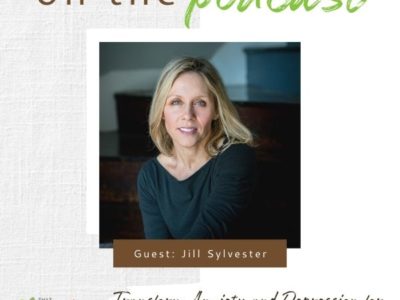Podcast: Play in new window | Download
Subscribe: Apple Podcasts | RSS
Last Updated on June 29, 2022 by Rebecca Huff
Trust Your Intuition: 100 Ways to Transform Anxiety and Depression for Stronger Mental Health
In this episode of A Healthy Bite, we are discussing how to help our kids have healthier minds.
 Meet Jill Sylvester, a licensed mental health counselor and author of two books that can help parents and children strengthen their mental health.
Meet Jill Sylvester, a licensed mental health counselor and author of two books that can help parents and children strengthen their mental health.
- A Young Adult novel “The Land of Blue” which deals with the themes of depression, anxiety, and addiction and is essentially a self-help book for all ages under the guise of YA fantasy fiction. It's a reliable tool for parents to help their children navigate OCD.
- A self-help book, “Trust Your intuition: 100 ways to transform anxiety and depression for stronger mental health.”
While there are hundreds of steps to choose from, in her book, here are a few simple actions that, if you stick with them, will bring about results and help you transform anxiety.
List 3 things you're grateful for every morning
Use a journal or make a mental note. By stating what you feel thankful for, you rise above the negative chatter in your mind.
Take an afternoon break
Breaks allow you to hit the pause button, helping you manage your emotions, so they don't get the better of you. Every afternoon, go out for a coffee. Or stretch, walk, or do whatever else helps you refresh.
Schedule regular mental health days
Days off nourish you like breaks. To make sure they happen, schedule monthly mental health days—a day to look forward to, to rest and refuel.
Trust your intuition
Recall that feeling of this is a definite yes, do that, go on that retreat, make that call, risk looking foolish. Don't doubt these feelings: they are signs pointing you in the right direction.
Building an intuition you can trust
Jill says that flexing your intuition muscle is a learning process, some of the steps she guides her clients through include:
Start small
Focus on day-to-day decisions such as food choice or minor requests you've received. Check-in with yourself about what you really feel is best.
Switch out of autopilot
When you're operating on autopilot, it's easy to be swayed by other people's choices. Don't let the voice of the inner gremlins steering you in the wrong direction take over.
Check-in with yourself
Do you feel expanded, open, and relaxed at the prospect of doing something, or tight, agitated, and restricted? The latter points to saying “no…”
Practice
Practice all of the above. The more you do it, the better you will get at it.
Over time you will see that in trusting your intuition, you will be able to act and choose from a place of confidence, self-assuredness, and self-possession.
Useful Tool for Anxiety
Trust Your Intuition contains five sections that focus on how to: Hold On through some of the most grueling feelings of anxiety and depression; Take Good Self-Care; Believe; Trust Your Intuition, and Feel Better.
The book is a great reference tool; flip through when you need to find just the right tool for a particular challenge. For example:
- Is anxiety creeping up on you? Play the “And Then What?” game, running the anxiety all the way through to a place where you emerge unscathed—or laughing!
- Are you feeling overwhelmed or on the verge of panic? Take a moment to distance yourself from the source.
- Is your child feeling anxious? Show him how to use the ‘tighten and release' technique to help tension leave his body. Bonus: you can do this too!
- Are you unnerved by your inner gremlins' negative voices? Learn to outsmart them by talking back.
- You are worried that your next lousy day is right around the corner? Don't wait for it to happen. Prevent it by scheduling regular mental health days off.
Above all, Trust Your Intuition delivers this powerful reminder: your intuition never lies. Through practice, you can learn to tune into its voice and follow it like an inner navigation system. You can strengthen intuition too, like a muscle, and come to trust your inner voice.
Would you enter The Land of Blue to find someone you love?

“Twelve-year-old Cassie Connor's father has mysteriously disappeared and her mother and grandparents won't tell her where he went, or why.
Then one hot August afternoon an endearing old lady named Agatha arrives on the dilapidated porch and tells Cassie that her father has gone to the Land of Blue and Cassie is the only one who can save him. It turns out that Agatha is the physical manifestation of the voice in Cassie's head, the authoritative voice that instructs her to bite her nails and skip the odd-numbered stairs.
Under Agatha's tutelage, Cassie–accompanied by her best friend Mariana who she brings along for support–Zippers between life at her Irish-Catholic, alcoholic grandparents' house in Boston, to the foggy, carnival style Land of Blue. Once they arrive, they meet TJ, a boy in search of his missing brother. The three become fast friends, in this place of seemingly never-ending fun, sharing in a similar mission. Yet, Cassie's plans to find her father and bring him home are consistently and suspiciously thwarted. That is until Cassie falls through the Ripple and discovers an alternate land that illuminates that things are not always what they seem and her father may stay trapped in the Land of Blue forever.
Will Cassie find her father and bring him home or will she, like so many others she meets along the way, remain in the alluring Land of Blue?”
The Land of Blue is a coming-of-age fantasy novel that takes readers young and old on a fascinating journey of the power of friendship, the love of family and ultimately, the choice to overcome darkness.
Questions I ask Jill in this episode:
What is anxiety? Is it a diagnosis or a feeling?
Why do you think we hear more about anxiety now versus say 30 years ago? Do you think kids experience more anxiety now, or do we talk about it more?
How can parents help teenagers who experience anxiety?
What are some of the ways we can identify a panic attack in a teen?
What suggestions do you have for a teenager who is having negative thoughts, excessive worrying, fear, dread, and other feelings associated with anxiety?
Is OCD on the rise? Do you have any tips for parents who have children diagnosed with Obsessive Compulsive Disorder?
We really hope you enjoyed this post and episode of A Healthy Bite! Take a minute to let us know what you think by leaving a review or commenting below. We also want to know what topics you think we might cover.
Feedback from you is what gives us the drive to keep going; and on a personal note it helps me know if I'm doing something that matters to my community. Thank you for being here!




 Salt Block Guacamole
Salt Block Guacamole
Leave a Reply
You must be logged in to post a comment.